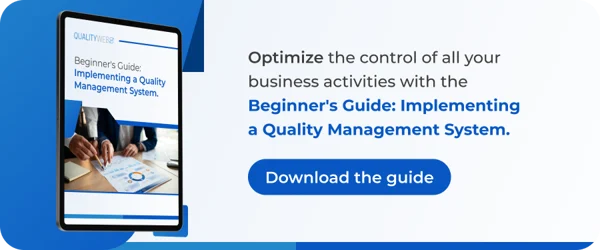Currently, many organizations face the challenge of maintaining high quality standards while staying competitive. Inconsistent quality can lead to dissatisfied customers, operational inefficiencies, and missed opportunities. Without a clear framework to address these issues, companies risk falling behind in an increasingly demanding market.
Think about the frustration of losing customers due to subpar products or services, or the inefficiencies that arise from disorganized processes. These challenges can hinder growth and compromise your company’s reputation.

For this reason, It’s essential to find a reliable solution that not only addresses these problems, but also propels your business forward. Below we present the benefits of implementing a Quality Management System in your company.
Enhanced customer satisfaction
A well-implemented Quality Management System ensures that customer needs are consistently met. By standardizing processes and focusing on quality control, businesses can reduce errors, improve product quality, and deliver a better experience. This leads to higher customer satisfaction and loyalty, which are essential for long-term success.
Operational efficiency
One of the key benefits is its ability to streamline operations. By identifying and eliminating inefficiencies, a Quality Management System can significantly reduce waste, optimize resource utilization, and lower production costs. This not only improves profitability but also makes the organization more competitive in the market.
Compliance with international standards
For companies looking to compete on a global scale, compliance with international standards like ISO 9001 is essential. This system provides a clear framework for meeting these standards, which can enhance the organization’s credibility and open up new business opportunities in international markets.

Continuous improvement
A Quality Management System fosters a culture of continuous improvement by encouraging organizations to regularly evaluate and refine their processes. This ongoing focus on quality and efficiency can lead to innovations that further enhance business performance and provide a competitive edge.
Risk management
It helps businesses identify potential risks and implement measures to mitigate them. This proactive approach to risk management can prevent costly mistakes and ensure the organization is better prepared to handle unexpected challenges.
The path to ISO 9001 certification
For many businesses, achieving ISO 9001 certification is a major milestone. This certification is recognized worldwide as a mark of quality and excellence. It demonstrates an organization’s commitment to maintaining high standards and continuous improvement.
Implementing a Quality Management System is the first step towards achieving this certification, providing a solid foundation for compliance with ISO 9001 requirements.
Continue reading:
5 signs that your company needs a quality management system
As you can see, these benefits are more than just a compliance measure; it is a strategic decision that can drive significant results for your company. From enhancing customer satisfaction to improving operational efficiency and achieving international recognition, a Quality Management System can be a game-changer for businesses aiming to excel in today’s competitive market.
If you want to explore more benefits download our “Beginner’s Guide: Implementing a Quality Management System.” This guide provides a detailed overview of this fascinating topic.




